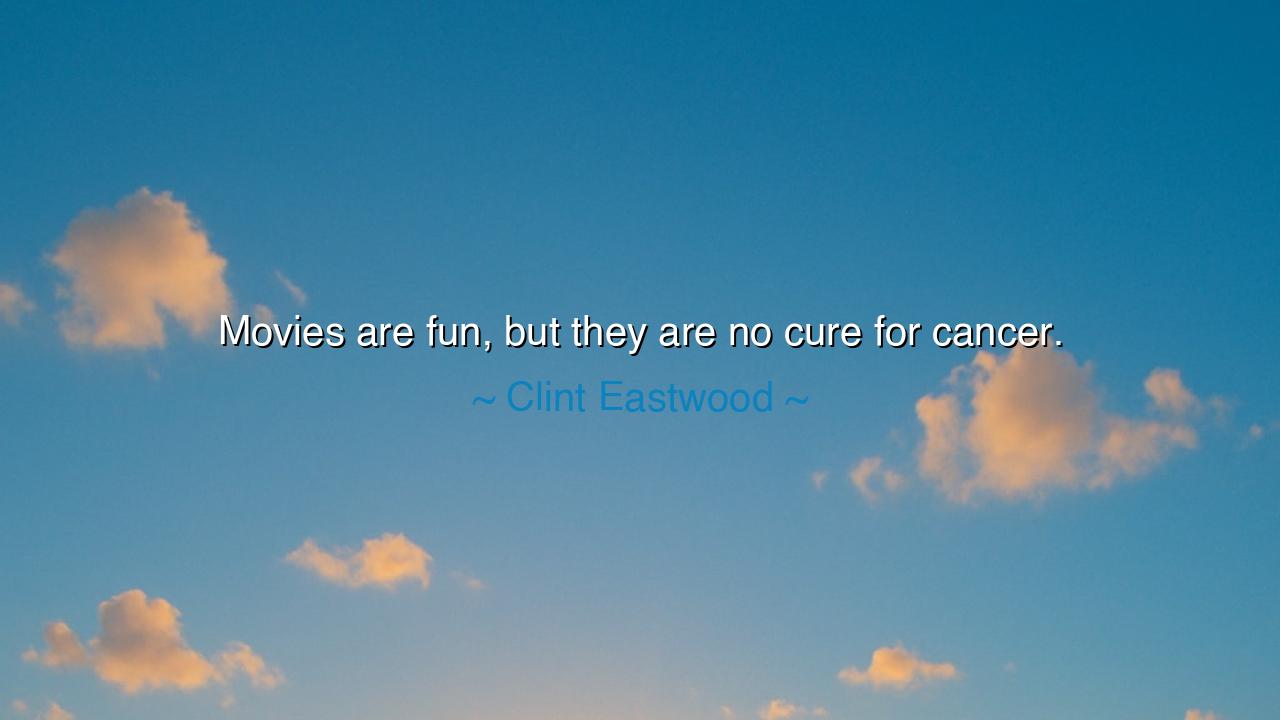
Movies are fun, but they are no cure for cancer.






In the grand course of human existence, where every soul seeks meaning, purpose, and solace, there are times when we are faced with profound challenges that cannot be cured by mere entertainment or distraction. Clint Eastwood’s words, “Movies are fun, but they are no cure for cancer,” remind us of the limits of art and entertainment in the face of the realities of life’s greatest trials. While films may bring joy, inspiration, and moments of escape, there are human struggles—such as illness, loss, or suffering—that demand more than temporary relief. Eastwood’s statement speaks to a fundamental truth: that while the arts play a vital role in our emotional and intellectual lives, they are not a substitute for the deeper, more urgent needs of the soul and body in times of crisis.
In the ancient world, philosophers and storytellers alike recognized the limits of pleasure and entertainment. Plato, in his Republic, cautioned against the distractions of theater and games that might pull people away from their pursuit of virtue and the good life. While art and beauty held a sacred place in the life of a citizen, Plato believed that true happiness came from pursuing knowledge and understanding the eternal truths that govern the cosmos. Similarly, Aristotle in his Nicomachean Ethics spoke of the importance of living virtuously, but he also understood that life was marked by struggles—trials that could not be erased by fleeting moments of pleasure. The arts, he believed, could elevate the soul, but they were insufficient for confronting the deepest human dilemmas.
Sophocles, the great Greek playwright, gave the world tragic stories that did not offer easy answers or comfort. His works, such as Oedipus Rex, did not shy away from the stark realities of human suffering, fate, and loss. These tragedies were not meant to provide simple escapes, but to confront the audience with the harsh truths of life. The characters in these plays were often heroes who, despite their wisdom or courage, could not escape the inevitable forces that shaped their lives. In the same spirit, Eastwood’s reflection reminds us that while movies may offer a temporary respite, they cannot substitute the real work required to face and overcome life’s most difficult struggles, such as illness or loss.
In Rome, Cicero spoke of the philosophical life as one that requires a deep engagement with the human condition. He believed that wisdom and virtue were the tools by which people could endure the challenges of life, especially in the face of adversity. While entertainment was valued in Roman society, it was ultimately philosophy, duty, and moral strength that carried one through the storms of life. Much like Cicero, Eastwood’s words suggest that we must recognize the limits of what art can provide. Art, like the gladiatorial games of ancient Rome, can offer momentary relief, but it is the deeper strength of the human spirit, supported by virtue and purpose, that is needed to endure life’s greatest tests.
The lesson in Eastwood’s words is one of perspective and priorities. While movies and entertainment can provide joy, meaning, and insight, they are not a replacement for the real work of life—whether it is battling a serious illness, grappling with personal tragedy, or navigating difficult decisions. The arts have their place in nurturing our spirits, but it is resilience, action, and love that help us face life’s toughest moments. Eastwood’s acknowledgment of the limits of film reminds us to keep our priorities in check and to focus on the substance of life—the things that truly matter—when we face suffering and loss.
In our own lives, we must take Eastwood’s message to heart and recognize that distractions like entertainment can never replace the important work of healing, growth, and perseverance. Movies can inspire, they can challenge us, and they can offer us solace, but they are not a substitute for real engagement with the difficult and transformative aspects of our existence. Whether we face physical illness, emotional pain, or any other form of hardship, it is in our actions, our courage, and our relationships that we find the strength to persevere.
Thus, as we navigate the complexities of life, let us remember that true healing comes not from avoiding the challenges we face but from confronting them with strength, wisdom, and compassion. Like the great philosophers and heroes of ancient times, we must find the courage to face adversity head-on, drawing strength from within and from those around us. In doing so, we can move beyond the temporary distractions and embrace the work of truly living and overcoming.






AAdministratorAdministrator
Welcome, honored guests. Please leave a comment, we will respond soon